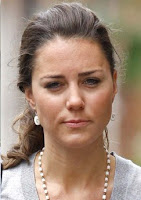Not so Holy Week. Easter Bunny and colored eggs aside, there's very little for the secular person to delight in at Eastertide. No diverting pagan traditions to compensate for the sorrowing with Tenebraes or the rejoicing with Easter Vigil Allelulias.
Just lilies and lamb and reruns of The Sound of Music on TV.
Well, it will have to do. As much as I love the liturgies of the Triduum, I seem to have reached some kind of milestone in my spiritual journey. Alas, I no longer find it possible to believe (as the White Queen recommends) in "six impossible things before breakfast." And, unlike Alice, I've had a great deal of practice, thank you.
For instance, I've worked very hard, over the years, to believe in the central assertion of Christianity: that a loving God cares so much about human beings that he, himself, became one of us--and, like us, died in agony in order, somehow, to make it possible for us to NOT DIE. Cut through all the metaphor, and Christianity's message is quite simple: God loves us and will not let us perish.
What a wonderful notion!
And yet, it just does not scan. It just does not compute. Here's why:
1) If God loves us so much, why didn't he simply give us eternal life when he created things way back when?
2) OK, maybe God wasn't really responsible for the creation. In other words, some other Being--an evil monster, obviously--actually brought the universe (and mankind) into being. This would explain the manifest imperfections of humanity and the world (and keep God off the hook).
3) So, in this view (basically some sort of Manicheism, I guess), God is a secondary force, himself subject to the Evil Monster who created the mess we call "reality."
 4) But God, in his pity for the creatures that the Demon created, figured out a way to save us: he became a man himself and sacrificed himself to the Demon. This, apparently, mollified the Demon--and allowed God to make a deal of sorts: human beings could have eternal life, but only after they die--not on earth, as would otherwise be logical.
4) But God, in his pity for the creatures that the Demon created, figured out a way to save us: he became a man himself and sacrificed himself to the Demon. This, apparently, mollified the Demon--and allowed God to make a deal of sorts: human beings could have eternal life, but only after they die--not on earth, as would otherwise be logical.5) But what's all the nonsense about saving ONLY those who "believe" in God? Doesn't that makes God sound almost as petty and nasty as the Demon himself?
6) And how could a "loving" God be so cruel, punishing the "victim" for his/her innate weaknesses (willed by the Demon, and not really the victim's fault)? Surely, God's redemption must be for ALL humans, not just right-believers.
7) Moreover, there's the question of evidence: why doesn't God make himself known and visible to everyone? Where IS heaven? How COULD a God become man? What is the relationship between God and the Demon? Why should we put any trust in a God who deals with the Demon?
8) Worst of all: orthodox Christianity asserts that the Demon and God are one and the same--that GOD himself created this horribly defective universe, that God himself gave humans the power to defy him and destroy themselves, that God himself demanded a blood sacrifice before he would agree to forgive humans for the imperfections he himself created in them, that God himself is so incredibly petty that he refuses salvation to all humans who either ignore or are merely ignorant of his expectations.
No, it does not compute. And it is, as the State Department says about human rights abuses in China, "unacceptable." At least to me.
 So, as I listen to Bach's sublime St Matthew Passion, I mourn. I mourn that I cannot believe in the metaphor that inspired this beautiful music. I mourn for humanity--which, despite these glorious chorales, has NOT been saved by any Sacred Head Now Wounded. Oh, yes. Good Friday is, indeed, a very GOOD idea. But it is also a lie. God (!) how I wish it were otherwise...
So, as I listen to Bach's sublime St Matthew Passion, I mourn. I mourn that I cannot believe in the metaphor that inspired this beautiful music. I mourn for humanity--which, despite these glorious chorales, has NOT been saved by any Sacred Head Now Wounded. Oh, yes. Good Friday is, indeed, a very GOOD idea. But it is also a lie. God (!) how I wish it were otherwise...But there is nothing to be done except, as Candide finally concluded, "cultiver notre jardin." Or as my grandpa always reminded us when Holy Week approached, "You have to plant your potatoes on Good Friday."








